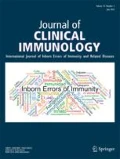Abstract
The Clinical Immunogenomics Research Consortium Australasia (CIRCA) crowdsources expertise in medicine, genomics, data science, and fundamental biology to diagnose and treat patients with rare inborn errors of immunity. This distributed network model operates free of geographic borders and allows rapid progression through the full research/translation/clinical management pipeline, from initial gene variant discovery, through functional validation, and on to precision mechanism-based treatment of patients throughout Australia and New Zealand. The model is scalable and applicable to other rare diseases where clinical experience and scientific know-how are limited, and enables efficient delivery of genomics for all.

References
Collins FS. Shattuck lecture--medical and societal consequences of the Human Genome Project. N Engl J Med. 1999;341(1):28–37.
Joyner MJ, Paneth N. Promises, promises, and precision medicine. J Clin Invest. 2019;129(3):946–8.
Kerner G, Ramirez-Alejo N, Seeleuthner Y, Yang R, Ogishi M, Cobat A, et al. Homozygosity for TYK2 P1104A underlies tuberculosis in about 1% of patients in a cohort of European ancestry. Proc Natl Acad Sci U S A. 2019;116(21):10430–4.
Tangye SG, Al-Herz W, Bousfiha A, Chatila T, Cunningham-Rundles C, Etzioni A, et al. Human Inborn Errors of Immunity: 2019 Update on the Classification from the International Union of Immunological Societies Expert Committee. J Clin Immunol. 2020;40(1):24-64.
Moran I, Avery DT, Payne K, Lenthall H, Davies EG, Burns S, et al. B cell-intrinsic requirement for STK4 in humoral immunity in mice and human subjects. J Allergy Clin Immunol. 2019;143(6):2302–5.
Lau A, Avery DT, Jackson K, Lenthall H, Volpi S, Brigden H, et al. Activated PI3Kdelta breaches multiple B cell tolerance checkpoints and causes autoantibody production. J Exp Med. 2020;217(2).
Avery DT, Kane A, Nguyen T, Lau A, Nguyen A, Lenthall H, et al. Germline-activating mutations in PIK3CD compromise B cell development and function. J Exp Med. 2018;215(8):2073–95.
Burnett DL, Parish IA, Masle-Farquhar E, Brink R, Goodnow CC. Murine LRBA deficiency causes CTLA-4 deficiency in Tregs without progression to immune dysregulation. Immunol Cell Biol. 2017;95(9):775–88.
Bier J, Rao G, Payne K, Brigden H, French E, Pelham SJ, et al. Activating mutations in PIK3CD disrupt the differentiation and function of human and murine CD4(+) T cells. J Allergy Clin Immunol. 2019;144(1):236–53.
Beziat V, Li J, Lin JX, Ma CS, Li P, Bousfiha A, et al. A recessive form of hyper-IgE syndrome by disruption of ZNF341-dependent STAT3 transcription and activity. Sci Immunol. 2018;3(24).
Pillay BA, Avery DT, Smart JM, Cole T, Choo S, Chan D, et al. Hematopoietic stem cell transplant effectively rescues lymphocyte differentiation and function in DOCK8-deficient patients. JCI Insight. 2019;5.
Frith K, Joly AL, Ma CS, Tangye SG, Lohse Z, Seitz C, et al. The FOXP3Delta2 isoform supports Treg cell development and protects against severe IPEX syndrome. J Allergy Clin Immunol. 2019;144(1):317–20 e8.
Klinken EM, Gray PE, Pillay B, Worley L, Edwards ESJ, Payne K, et al. Diversity of XMEN disease: description of 2 novel variants and analysis of the lymphocyte phenotype. J Clin Immunol. 2019.
Zammit NW, Siggs OM, Gray PE, Horikawa K, Langley DB, Walters SN, et al. Denisovan, modern human and mouse TNFAIP3 alleles tune A20 phosphorylation and immunity. Nat Immunol. 2019;20(10):1299–310.
Stray-Pedersen A, Sorte HS, Samarakoon P, Gambin T, Chinn IK, Coban Akdemir ZH, et al. Primary immunodeficiency diseases: genomic approaches delineate heterogeneous Mendelian disorders. J Allergy Clin Immunol. 2017;139(1):232–45.
Siggs OM, Russell A, Singh-Grewal D, Wong M, Chan P, Craig ME, et al. Preponderance of CTLA4 variation associated with autosomal dominant immune dysregulation in the MYPPPY motif. Front Immunol. 2019;10:1544.
Saldanha RG, Balka KR, Davidson S, Wainstein BK, Wong M, Macintosh R, et al. A mutation outside the dimerization domain causing atypical STING-associated vasculopathy with onset in infancy. Front Immunol. 2018;9:1535.
Leiding JW, Forbes LR. Mechanism-based precision therapy for the treatment of primary immunodeficiency and primary immunodysregulatory diseases. J Allergy Clin Immunol Pract. 2019;7(3):761–73.
Casanova JL, Conley ME, Seligman SJ, Abel L, Notarangelo LD. Guidelines for genetic studies in single patients: lessons from primary immunodeficiencies. J Exp Med. 2014;211(11):2137–49.
Acknowledgments
We thank the patients and their families and all the members of CIRCA who inspire our work. We also thank our colleagues and mentors Stephen Adelstein, Tony Basten, Tony Kelleher, Elissa Deenick, and Warren Kaplan for their critical discussions and comments on the manuscript. We thank Kate Patterson and Karen Enthoven for help with the artwork. The work by CIRCA detailed here was funded by the NSW Department of Health Office of Health and Medical Research, the John Brown Cook Foundation, the Ross Trust, the Jeffrey Modell Foundation, the Allergy and Immunodeficiency Foundation of Australia (AIFA), the St Vincent’s Clinic Foundation, the Garvan-Weizmann Foundation and the Sydney Partnership for Health, Education, Research and Enterprise (SPHERE), and NHMRC (1060303, 1088215, 1127157, 1139865). TGP is a recipient of an NHMRC Senior Research Fellowship (1155678). SGT is the recipient of an NHMRC Senior Investigator Award (1176665).
Author information
Authors and Affiliations
Consortia
Corresponding author
Ethics declarations
Conflict of Interest
The authors declare that they have no conflict of interest.
Additional information
Publisher’s Note
Springer Nature remains neutral with regard to jurisdictional claims in published maps and institutional affiliations.
Introline
CIRCA provides a distributed network that integrates clinical and scientific expertise to make genomic diagnoses
Rights and permissions
About this article
Cite this article
Phan, T.G., Gray, P.E., Wong, M. et al. The Clinical Immunogenomics Research Consortium Australasia (CIRCA): a Distributed Network Model for Genomic Healthcare Delivery. J Clin Immunol 40, 763–766 (2020). https://doi.org/10.1007/s10875-020-00787-6
Received:
Accepted:
Published:
Issue Date:
DOI: https://doi.org/10.1007/s10875-020-00787-6

